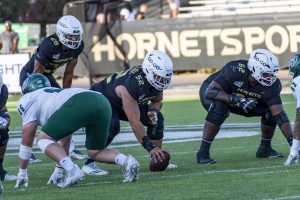‘Papers’ sheds light on youth illegal immigration issue
December 5, 2010
The documentary, “Papers: Stories of Undocumented Youth,” is a disquieting yet realistic view into the lives of illegal immigrant students and their pursuit of higher education.
This film screening, including the discussion afterwards, was part of the One Book Program which showcases works that deal with cultural and societal issues. This movie was selected by Hellen Lee-Keller, professor of English, and Elvia Ramirez professor of ethnic studies, as a platform to show the problem our society faces when illegal immigrant children turn 18 and have no path for higher education or toward citizenship.
The interviewees in the documentary expressed how easy it was for them to forget their legal status until the end of their high school education when they began to think about their future: Higher education or a job. Most of the children only know American culture; they have never known any other society and many only speak English.
“I’ve never felt like an immigrant; I feel like everyone else. I’ve grown up here,” explained high school senior, Monica, one of the youth highlighted in this film.
Simone, another illegal immigrant youth, spoke of trying to get into college and being yelled at by a supervisor after being unable to produce a Social Security number.
“He yelled at me in front of everyone saying, “You are illegal. You don’t have what it takes to make it!'” Simone said.
Simone had a 4.0 GPA and has never known any country or culture than the American one she grew up in.
This documentary highlighted that the education system needs to change first, especially since these kids are real humans, intelligent, oppressed and usually a scapegoat to hate crimes. Of the 12 million undocumented residents in the United States, 2 million of them are children in our education system, facing a tough transition after graduation.
The following discussion focused on how the government forces illegal immigrants to remain in the shadows, especially since there are not very many options for higher education. The group also discussed how to handle this societal problem, as a legal citizen or an illegal immigrant.
The conversation focused on the biggest issue of all: What should the United States do about the millions of 18-year-old illegal immigrants that are aliens in their home country and unwelcomed in the United States?
“We as a country don’t make it easy,” explained Lee-Keller. “The fees, the money, the constant fear of deportation, families being split apart &- this is what happens.”
Five students, three faculty and two facilitators were all actively involved in discussing the issue of immigration, both with their own experiences and problems with the current path towards immigration.
For Lee-Keller, immigration is a personal experience. She came to America illegally as an infant and was granted amnesty under Jimmy Carter. Lee-Keller still felt a sense of cultural abandonment and insecurity growing up and stressed to the group the importance of finding a mentor for your transition, advice that was eagerly listened to by the group.
“When I was in my PhD program I found an Asian-American in my department and I just knew this woman would be my mentor,” Lee-Keller said. “That didn’t work. She was only into herself and her career. I ended up having a mentor in a different department and the opposite gender. I’ve had a Jewish man, a Midwestern woman, everyone. You just need someone that helps you. You are up against a lot and you need that.”
This conversation, like the documentary, stressed the importance of a change in the United State’s pathway towards citizenship, especially when it comes to the students already excelling as active members in this society.
Leia Ostermann can be reached at [email protected]























































































































